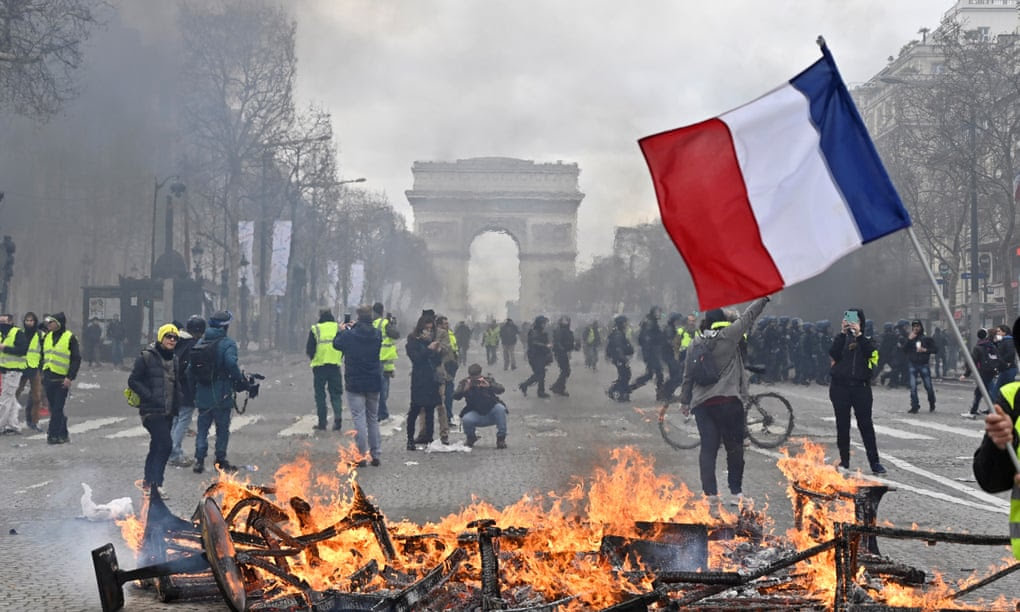What are the reasons for the riots?
The riots are being fueled by a number of factors, including:
- Anger over the police shooting of Nahel M.
- A history of police brutality and discrimination against minorities in France
- Economic inequality and social exclusion
- A sense of frustration and hopelessness among young people
France Riots: Latest Happenings
- The riots have now entered their sixth day.
- They have spread to cities across the country, including Paris, Marseille, and Nice.
- In the latest violence, police fired tear gas and clashed with protesters in Marseille on July 2. There were also reports of looting and arson in the city.
- In Paris, protesters set fire to a police van and clashed with police in the city center.
- As of July 3, police have arrested more than 2,100 people and more than 200 police officers have been injured.
- Around 45,000 officers were deployed nationwide to counter violence fuelled by anger over discrimination against people who trace their roots to former French colonies and live in low-income neighbourhoods.
- The protests are being fueled by anger over the police shooting of Nahel M., who was shot and killed by a police officer in Nanterre, a suburb of Paris.
The shooting has sparked outrage in France, with many people accusing the police of excessive force. Protests have erupted in cities across the country, with some turning violent. There have been reports of looting, arson, and clashes with police. The French government has deployed thousands of police officers to try to quell the unrest.
French President Emmanuel Macron has blamed social media for the spread of the unrest and called on parents to take responsibility for their teenagers. Eric Dupond-Moretti, the justice minister, told France Inter radio that parents who abdicated that responsibility “either through disinterest or deliberately” would be prosecuted.
The current wave of protests is raising questions about race relations and police brutality in France. It is also putting pressure on President Emmanuel Macron, who has been criticized for his handling of the situation. Macron has called for calm and urged the protesters to respect the law. However, he has also acknowledged the need for reforms to the French police force.
Discrimination against migrants a factor in France riots
For example, a 2020 study by the French Institute for Social Security found that immigrants are more likely to be unemployed and to live in poverty than native-born French citizens. They are also more likely to be stopped and searched by the police.
This discrimination can create a sense of frustration and hopelessness among migrants and their descendants, which can lead to anger and violence. In the case of the recent riots, some protesters have expressed anger at the police for their perceived mistreatment of migrants.
It is important to note that not all migrants in France support the riots. Many migrants have spoken out against the violence and have urged for peaceful protest. However, the riots have highlighted the challenges that migrants face in France and the need for the government to address these challenges.
The French government has taken some steps to address the issue of discrimination against migrants. In 2021, the government passed a law that makes it illegal to discriminate against people on the basis of their origin, nationality, or ethnic origin. However, more needs to be done to ensure that migrants and their descendants have equal opportunities in France.
The riots in France are a reminder that the issue of migration is complex and there is no easy solution. However, by working together, it is possible to find a way to ensure that all people in France, regardless of their origin, have the opportunity to live a safe and prosperous life.
How Will the Riots Affect the World?
The riots in France are likely to have a ripple effect around the world. They are a reminder of the challenges that many countries face in terms of race relations and police brutality. The protests could also lead to a renewed focus on these issues in other countries.
The riots could also have an impact on the global economy. If the protests continue for an extended period of time, they could lead to businesses being damaged or closed. This could have a negative impact on the French economy and could also spill over into other economies.
The unrest has raised concerns abroad, with France hosting the Rugby World Cup in the autumn and the Paris Olympic Games in the summer of 2024.
Britain and other European countries updated their travel advice to warn tourists to stay away from areas affected by the rioting.
China’s consulate in Marseille similarly warned its citizens to “be vigilant and exercise caution” after state-run media reported the pelting with stones of a bus carrying Chinese tourists in the southern city.< ..
Conclusion
The riots in France are a serious challenge for the country. They are a sign of deep-seated anger and frustration, and they could lead to further violence and property damage. The future of the protests is uncertain, but they are likely to have a ripple effect around the world.



